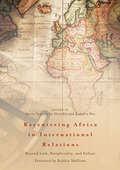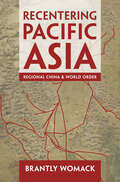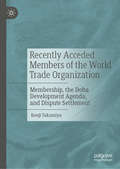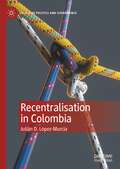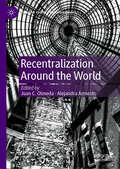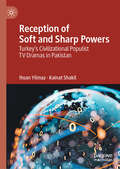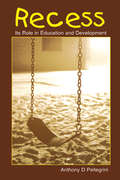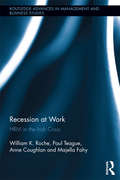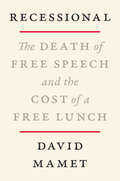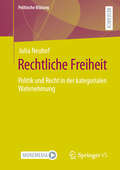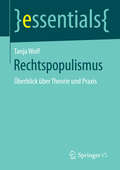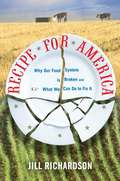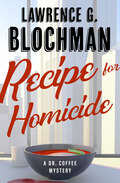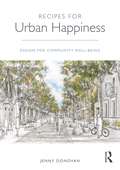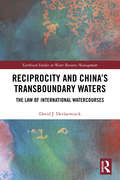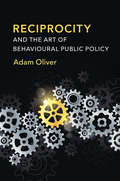- Table View
- List View
Recent Perspectives on Early Childhood Education in Canada
by Nina Howe Larry ProchnerEarly childhood education is critical for preparing children for success in formal school settings, and as such, is a major concern throughout the world. This volume brings together ground-breaking research in this area to help practitioners, students, policy makers, curriculum designers, and intervention program developers understand the latest ideas and advances in the field.Recent Perspectives of Early Childhood Education and Care in Canada centres on three key themes. The first provides a survey of historical, social policy, economic, and provincial regulations and policies related to early childhood education and care. The second focuses on issues related to children's learning, curriculum, and teachers. The final theme addresses recent developments in government involvement in early childhood education and care that are unique to Canada. The contributors to this volume demonstrate the pressing need that exists to further public discussion on early childhood education to help policymakers shape better decisions for Canadian families.
Recentering Africa in International Relations: Beyond Lack, Periphery And Failure
by Zubairu Wai Marta Iñiguez de HerediaThis innovative book responds to an existing demand for taking Africa out of a place of exception and marginality, and placing it at the center of international relations and world politics. Bringing together a number of scholars from various disciplinary backgrounds to stage a critical intervention into the problematic ways Africa is accounted for in the dominant discourses of international relations and global politics, it challenges the structural and epistemic biases of IR that render the contributions of the continent invisible, and situates the continent as a global region that exists beyond notions of lack, disorder, and failure. Through these interventions, the volume contributes to a rethinking of IR, and the conditions of possibility for imagining a world otherwise beyond frames that fetishize Africa paradoxically as transparent and invisible.
Recentering Pacific Asia: Regional China and World Order
by Brantly WomackThe Pacific Rim of Asia – Pacific Asia – is now the world's largest and most cohesive economic region, and China has returned to its center. China's global outlook is shaped by its regional experience, first as a pre-modern Asian center, then displaced by Western-oriented modernization, and now returning as a central producer and market in a globalized region. Developments since 2008 have been so rapid that future directions are uncertain, but China's presence, population, and production guarantee it a key role. As a global competitor, China has awakened American anxieties and the US-China rivalry has become a major concern for the rest of the world. However, rather than facing a power transition between hegemons, the US and China are primary nodes in a multi-layered, interconnected global matrix that neither can control. Brantly Womack argues that Pacific Asia is now the key venue for working out a new world order.
Recently Acceded Members of the World Trade Organization: Membership, the Doha Development Agenda, and Dispute Settlement
by Kenji TakamiyaThe book sheds light on trade policies of developing economies that joined the multilateral trading system after establishment of the World Trade Organization (WTO) in 1995, once known as the recently acceded members (RAMs). Its detailed case studies on Georgia, the People’s Republic of China, Viet Nam and Ecuador examine their engagement in accession and Doha Round negotiations and, where relevant, dispute settlement at the WTO. Using the economic theories of trade agreements and negotiations as a guide for intellectual inquiries, this book assesses motivations accounting for the RAMs’ evolving behaviors in the multilateral trading system. The first two chapters present background and overview, followed by four chapters on country-specific case studies. The book is concluded with the last chapter that provides one possible explanation of why the Doha Round has been faced with deadlocks while accession and dispute settlement have been working effectively.
Recentralisation in Colombia (Executive Politics and Governance)
by Julián D. López-MurciaThis book tackles the question of how to characterise and account for recentralisation in Colombia between central and lower levels of government across a 26-year period. Around the world, the COVID-19 pandemic has once again put the distribution of responsibilities, resources, and authority between different levels of government at the heart of political debate. This book brings this issue to light as a topic central to the study of public administration.Drawing on extensive fi eldwork with more than a hundred interviews with former presidents, ministers, members of congress, governors, local mayors and subnational public offi cials, as well as documentary sources, it begins with a historical account of recentralisation processes in the world. It then proposes a theoretical framework to explain these processes, before tracing and carefully comparing recentralisation episodes in Colombia using theory-guided process tracing.
Recentralization Around the World (Executive Politics and Governance)
by Juan C. Olmeda Alejandra ArmestoThe 1990s witnessed a surge in decentralization, as national governments around the world sought to transfer responsibilities and prerogatives to regional and local authorities. The last two decades have seen a reversal of this trend, as national authorities have attempted to regain control over these decentralized tasks in a process known as recentralization. This book is one of the first studies to examine the process of recentralization in a global context. Drawing on country case studies from around the world, including both developed and developing countries, and democratic and authoritarian regimes, the book assesses where and why recentralization has taken place, and what has contributed to its successes and failures. It also examines recentralization in key policy areas, including education policy, health policy and environmental policy. The overall aim is to provide readers with a conceptual and theoretical understanding of recentralization and its consequences, as well as a comparative global overview of common trends and key distinctions at national and regional level. The book will appeal to all those interested in public administration, comparative politics, political science and sociology.
Reception of Soft and Sharp Powers: Turkey’s Civilizational Populist TV Dramas in Pakistan
by Ihsan Yilmaz Kainat ShakilThis book examines the projection of soft and sharp powers through the Turkish civilizational populist TV series "Resurrection: Ertugrul" and its reception in Pakistan. By analyzing the content of the series, elite responses, interviews with ordinary Pakistanis, and Pakistani cyberspace, the book argues that beyond soft power, the show exerts Turkey’s sharp power transnationally, through themes of authoritarianism, violence, warfare, desire for killing and dying, Islamist collective victimhood, conspiracy theories and anti-Christian sentiments. The book contributes to the literatures on sharp power, populism, and authoritarianism.
Recess: Its Role in Education and Development (Developing Mind Series)
by Anthony D. PellegriniWriting a book about recess could be a very questionable endeavor for a serious academic psychologist. At first blush it seems to be a pretty trivial topic. It's the time during the school day where there's a break from what's typically considered the most serious work of the day--reading, writing, and arithmetic. Reflecting this trivial tenor, it's also that time of the school day that kids--perhaps only half jokingly--say is their favorite part of school. This perception has lead many schools to question the role of recess in the school day. This book is an attempt to broach two views of recess--the perceived value of recess and the movement to eliminate or reduce the school recess period from the primary school day. Due to tightened school budgets and the emphasis on testing, many elementary schools eliminate recess, gym classes, and play periods to the developmental detriment of the very children the schools are supposed to serve. Author Anthony Pellegrini has conducted a number of careful studies regarding student attentiveness and performance within programs that have recess periods, and those that don't. The data show that students need recess in order to blow off energy and interact with each other in the unstructured recess environment in order to grow socially. The goal of Recess is to help readers realize the importance of recess and counter the trend to eliminate it from schools. This book appeals to academics, teachers, administrators, and parents.
Recession at Work: HRM in the Irish Crisis (Routledge Advances in Management and Business Studies #55)
by Bill Roche Paul Teague Anne Coughlan Majella FahyHow has the recession affected the conduct of human resource management? How have HR departments and managers fared? Have leading firms taken measures to sustain and revive their businesses through innovative HR measures? How have union representation and influence been affected? Is the recession reshaping work and employment practices? These are among the questions answered in Recession at Work, the first systematic study in Europe to deal with the effects of the economic crisis on people at work. Drawing on survey data for Ireland provided by nearly 500 managers responsible for human resources, on focus groups of HR managers and trade union officials, and on detailed case studies of six major firms, the book provides an unrivalled picture of the effects of the current recession on how people are managed and how they are represented by trade unions. Examining the effects of the Irish recession on work and employment in the context of international experience and commentary, this book provides detailed information and analysis on the ways in which firms have sought to handle the challenges that have arisen since the severe reverse in Ireland’s economic fortunes in 2008.
Recessional: The Death of Free Speech and the Cost of a Free Lunch
by David MametIn RECESSIONAL David Mamet calls out, skewers, mocks, and, most importantly, dissects the virus of conformity which is now an existential threat to the West. A broad-ranging journey through history, the Bible, and literature, RECESSIONAL examines how politics and cultural attitudes about rebellion have shifted in the United States in the last generation. <p><p>By screaming down freedom of thought and expression, Mamet explains, we kill invention and democracy – the foundations of security and growth. A wickedly funny, wistful and wry appeal to the free-thinking citizen, RECESSIONAL is a vital warning that if we don’t confront the cultural thuggery now, the commissars and their dupes will transform the Land of the Free into the dictatorship at which they aim. <p> <b>New York Times Bestseller</b>
Recht auf Liebe: Eine Diskursanalyse über die gleichgeschlechtliche Ehe in Deutschland (Theorie und Praxis der Diskursforschung)
by Sabine Exner-KrikorianSabine Exner-Krikorian untersucht in dieser Studie den Diskurs über die gleichgeschlechtliche Ehe in Deutschland von 1998 bis 2017. Sie geht der Frage nach, wie zeitgenössische religiöse, politische und gesellschaftliche Akteur*innen um die Deutungshoheit von Ehe wetteifern. Im Detail wird gezeigt, dass die Diskursakteur*innen in diesem Aushandlungsprozess die Prämisse einer angenommenen Moderne, die Dichotomie religiös/säkular sowie Narrative von und über Religion(en) als diskursive Strategien einsetzen. Eingebettet ist die Analyse in eine historische Rekonstruktion der Ehe seit der Reformation als Deutungs- und Machtkampf politischer und religiöser Akteur*innen. Mit einem zeit-, akteurs- und arenaspezifischen Ansatz verknüpft die Autorin methodologisch die Wissenssoziologische Diskursanalyse (WDA) nach Reiner Keller mit einem religionswissenschaftlichen Erkenntnisinteresse.
Rechte Akteure im Betrieb: Sechs EU-Länder im Vergleich
by Samuel Greef Wolfgang Schroeder Seongcheol KimDieses Buch ist die erste vergleichende Studie über rechte Kommunikations- und Organisierungsbestrebungen auf betrieblicher Ebene sowie gewerkschaftliche Gegenreaktionen. Im Rahmen eines europäischen Sechs-Länder-Vergleichs (Belgien, Deutschland, Frankreich, Italien, Polen, Ungarn), der auch eine Betriebsfallstudie für jedes Land umfasst, wird eine Klassifikation rechter Aktivitäten und gewerkschaftlicher Reaktionen herausgearbeitet. Der Band beruht auf einem in Zusammenarbeit mit Gewerkschaften durchgeführten Forschungsprojekt und damit auf einem Theorie-Praxis-Dialog zu diesem hochaktuellen Thema.
Rechtliche Freiheit: Politik und Recht in der kategorialen Wahrnehmung (Politische Bildung)
by Julia NeuhofJulia Neuhof zeigt, dass Komplexität und Unübersichtlichkeit politisch-rechtlicher Entwicklungen in der modernen Gesellschaft über eine kategorial orientierte politische Bildung vermittelbar sein können. Die Voraussetzungen hierfür werden in einer qualitativen Studie zu der Wahrnehmung rechtlicher Freiheit mit Schülerinnen erfasst. So existieren thematisch vielfältige Kategorisierungen der Lernenden. Für diese lassen sich auf dem politikdidaktisch tradierten Weg kategorialer Bildung Anschlüsse an sozialwissenschaftliche Begriffe zur Deutung politisch-rechtlicher Realität schaffen. Darüber hinaus bestehen jedoch Wahrnehmungshindernisse in der kategorialen Erschließung, die neue politikdidaktische Lehr-Lern-Strategien erforderlich machen. Wie diese aussehen können, wird von der Autorin im Kontext politisch-rechtlichen Lernens vorgeschlagen.
Rechtsextremismus in Deutschland: Eine kritische Bestandsaufnahme
by Armin Pfahl-TraughberGegenwärtig ist viel vom „Rechtsruck“ die Rede. Doch in der Bundesrepublik Deutschland hat es immer auch Rechtsextremismus gegeben. Die aktuellen Entwicklungen sollten daher im Kontext der Vergangenheit gesehen werden. Das vorliegende Buch versteht sich sowohl als Einführung wie als Überblicksdarstellung dazu. Es werden die zentralen Begriffe definiert und konkretisiert sowie die Ideologieelemente und -familien erläutert und unterschieden. Der inhaltlichen Kern besteht aus einer Darstellung und Einschätzung der Entwicklung des parteiförmigen und kulturellen, aktionsorientierten und organisationsförmigen, subkulturellen und bewegungsförmigen, gewalttätigen und terroristischen Rechtsextremismus. Dabei werden auch die AfD, die Neue Rechte oder Pegida als neue Phänomene behandelt und eingeschätzt. Außerdem stehen die rechtsextremistischen Einstellungen in der Gesellschaft mit im Zentrum. Und dann werden die Erklärungsansätze noch beschreibend dargestellt und kritisch erörtert. All dies mündet in einer bilanzierenden Gefahrenpotentialeinschätzung
Rechtsextremismus in Schule, Unterricht und Lehrkräftebildung (Edition Rechtsextremismus)
by Jan Schedler Sabine Achour Gabi Elverich Annemarie JordanSchule kommt eine Schlüsselfunktion in der Auseinandersetzung mit dem Rechtsextremismus zu. In ihrem bildungspolitischen Auftrag kann Schule nicht neutral sein. Sie hat die Aufgabe, pluralistische, demokratische und menschenrechtsorientierte Haltungen und Werte zu vermitteln. Dieser Band gibt einen Überblick über das Thema Rechtsextremismus und Schule sowie Verweise auf praktische Handlungsperspektiven. Neben einer Bestandsaufnahme schulischer Ansätze zur Auseinandersetzung mit dem Thema Rechtsextremismus wird auch die Lehrkräftebildung in den Blick genommen.
Rechtsextremismus, Demokratiebildung, gesellschaftliche Integration: Interdisziplinäre Debatten und Forschungsbilanzen
by Danny Michelsen Andreas BeelmannDer Band präsentiert aktuelle Forschungsergebnisse des Zentrums für Rechtsextremismusforschung, Demokratiebildung und gesellschaftliche Integration (KomRex) der Friedrich-Schiller-Universität Jena. Im ersten Teil werden neben Analysen zum Thema Rechtsextremismus und Radikalisierung aktuelle Befunde der politischen Einstellungsforschung vorgestellt, die u. a. auf Daten des jährlich durchgeführten Thüringen-Monitors basieren. Der zweite Teil fragt nach Grundlagen für eine zeitgemäße Demokratiepädagogik und Extremismusprävention sowie nach den Voraussetzungen für eine erfolgreiche Integration von Migrant*innen.
Rechtspopulismus in Deutschland: Wahlverhalten in Zeiten politischer Polarisierung
by Karl-Heinz Reuband Heinz Ulrich BrinkmannWelchen Stellenwert haben soziökonomische, politische und kulturelle Faktoren für rechtspopulistischen Protest und die Wahl der AfD? Welchen Einfluss nehmen regionale Lebensbedingungen und Sozialisationsprozesse? Und wie sehr wirkt die „Flüchtlingskrise“ ein, selbst nachdem sie aus dem Blickpunkt der Öffentlichkeit gerückt ist? Auf der Basis neuer empirischer Befunde und Analysen werden in dem vorliegenden Band Prozesse und Potentiale gesellschaftlicher Polarisierung untersucht und neue Perspektiven eröffnet.
Rechtspopulismus: Überblick über Theorie und Praxis (essentials)
by Tanja WolfZiel dieses essential ist, das Ph#65533;nomen des Rechtspopulismus mittels konkreter Begriffsdefinition, zentraler Merkmale und ausgew#65533;hlter Fallbeispiele pr#65533;zise und leicht verst#65533;ndlich zu erkl#65533;ren. Die Diskussion um die Findung einer einheitlichen Definition sowie die fr#65533;hesten populistischen Bewegungen, wie etwa die People's Party, werden beschrieben um das Verst#65533;ndnis f#65533;r das Konzept des (Rechts-)populismus und seine Grenzen zu sch#65533;rfen. Verschiedene typische Charakteristika wie das spezielle Verh#65533;ltnis zu den Medien oder der charismatische Anf#65533;hrer sollen den Blick f#65533;r populistische Ph#65533;nomene in der heutigen Zeit kl#65533;ren und die Analyse der beiden Fallbeispiele PVV und AfD, sowie ihre spezifischen Eigenheiten leichter nachvollziehbar machen.
Rechtsterrorismus in der alten Bundesrepublik: Historische und sozialwissenschaftliche Perspektiven (Edition Rechtsextremismus)
by Fabian Virchow Hendrik PulsDie politische und wissenschaftliche Aufmerksamkeit für rechtsterroristische Gewalt hat nach Bekanntwerden der Morde des NSU (Nationalsozialistischer Untergrund) zugenommen. Zugleich ist die lange Geschichte des Rechtsterrorismus in Deutschland im Detail und unter Auswertung zeitgenössischer Archivalien und Dokumente noch weitgehend unerforscht. Der Band versammelt entsprechend aktuelle Forschungsergebnisse zu rechtsterroristischer Gewalt in den 1980er Jahren, einer Hochphase dieser Gewaltpraxis.
Rechtsterrorismus: Radikale Milieus, Politische Gelegenheitsstrukturen und Framing am Beispiel des NSU (Bürgergesellschaft und Demokratie)
by Jan SchedlerDer „Nationalsozialistische Untergrund“ (NSU) ermordete bis zu seiner Selbstaufdeckung 2011 zehn Menschen und verletzte zahlreiche weitere. Zwischen 1999 und 2011 verübte die Gruppe zehn Mordanschläge und drei Sprengstoffanschläge. Während die Bundesanwaltschaft im NSU-Prozess das Bild eines isolierten und nur von einzelnen Neonazis unterstützten Trios zeichnete, dem auch das Gericht in seinem Urteil folgte, zeichnet diese Studie ein verzweigtes Netzwerk nach und betont die Rolle der neonazistischen Bewegung bei der Entstehung, Radikalisierung und Unterstützung des NSU. Unter Rückgriff auf Ansätze aus der Forschung zu sozialen Bewegungen wird neben der Bedeutung radikaler Milieus auch die gesellschaftlicher Kontextbedingungen herausgearbeitet. Zu diesen Gelegenheitsstrukturen zählen etwa das Protest Policing, insbesondere die Vertrauenspersonenpraxis der Verfassungsschutzämter, oder der Asyldiskurs in den frühen 1990er Jahren. Auf der Grundlage von empirischem Material aus der neonazistischen Bewegung wird zusätzlich der bewegungsinterne Gewaltdiskurs untersucht und die diskursive Konstruktion von Deutungs- und Handlungsrahmen in Bewegung und radikalen Milieus und ihre Bedeutung für die Gewaltpraxis des NSU analysiert. Damit zeigt diese Studie Perspektiven für die Erforschung des Rechtsterrorismus auf, die auch unabhängig vom NSU relevant sind.
Recipe for America
by Jill Richardson"Jill Richardson is a fresh voice in the movement to create a healthier and sustainable food system. This book will be part of the burgeoning food social movement, as it provides a guide to the most important issues and how to work on them."--Marion Nestle"Jill's work at Daily Kos represents the best of the people-powered movement. It's a pleasure to see her work reach a new plateau and come to the attention of a wider audience."--Markos MoulitsasAmerica's food system is dominated by agribusiness and corporate farms, whose destructive practices pollute the environment, are cruel to animals, and offer us unhealthy food choices. Despite this dire situation, most people have little idea how to eat differently, or healthier.In Recipe for America, food activist Jill Richardson shows how sustainable agriculture--where local farms raise food that is healthy for consumers and animals and does not damage the environment--offers the only solution to America's food crisis. In addition to highlighting the harmful conditions at factory farms, this timely and necessary book details the rising grassroots food movement, which is creating an agricultural system that allows people to eat sustainably, locally, and seasonally.A call to action for those who are concerned about what they eat and the health of the planet, Recipe for America shows how sustainable eating nourishes our bodies, our economy, and our environment, and how it is the best hope for the future of food in America.Jill Richardson blogs about food issues at Daily Kos and at her own blog, La Vida Locavore (http://www.lavidalocavore.org). She is also a member of the advisory board of the Organic Consumers Association.
Recipe for Homicide (The Dr. Daniel Webster Coffee Mysteries)
by Lawrence G. BlochmanA public relations man finds himself in hot water when murder is added to the mix at the soup company where he works. Luckily, Dr. Coffee is on the case. After crowning a Carrot Queen—the fastest carrot peeler at the factory—the Barzac Soup Company is on a public relations roll under director Robert Gilmore. It plans to raise its profile—and stock price—even higher by introducing field rations for the US Army. But when an employee drops dead hours after tasting the field rations, Gilmore has a PR nightmare on his hands . . . With his job on the line, Gilmore seeks the help of pathologist Dr. Daniel Webster Coffee, a man who enjoys good food as much as the unassailable practice of good medicine. But what he discovers raises the stakes: The victim died of arsenic poisoning. The rations could have been deliberately sabotaged as an act of war. As tensions reach a boiling point, Gilmore finds his past, his heart, and his life on the line . . . &“Blochman fans generally tend to think of him as more intellectual than the average pulp author, and based on one book, we can&’t disagree. Recipe is scientific detection, and plenty detailed enough for readers who like that sort of thing . . . for 1954, this is nuanced stuff.&” —Pulp International
Recipes for Urban Happiness: Design for Community Well-being
by Jenny DonovanThe experiences we enjoy, endure, or miss out on are influenced by what our surroundings allow and invite us to do. Just like our food diet, our experience diet influences our health and so our chances of finding happiness and fulfilling our potential. A healthy experience diet offers inspiration, reassurance, delight, and play. It nurtures physical, cognitive, and emotional health, builds resilience, and fosters confidence and self-esteem. An unhealthy experience diet lacks these things and consigns people to lives diminished in quantity and quality. Recipes for Urban Happiness offers an innovative way of looking at the relationship between people and place and redefines what good urban design is. The book outlines what designers and non-designers can do to create urban places where nurturing behaviours are both possible and preferable. Recipes for Urban Happiness will be relevant to public health, community development, and design practitioners, as well as students and academics.
Reciprocity and China’s Transboundary Waters: The Law of International Watercourses (Earthscan Studies in Water Resource Management)
by David J. DevlaeminckUtilizing the principle of reciprocity, Reciprocity and China’s Transboundary Waters: The Law of International Watercourses analyses the past, present and future of the law of international watercourses with a particular focus on China. As a legal principle, reciprocity plays a strong role in the formation, interpretation and maintenance of international law. Implementing this framework, the book examines the development of the law of international watercourses, highlighting how this basic legal principle is a foundational notion. It applies the framework to China and offers insights into one of the most important transboundary states in Asia. As a primarily upstream state, China is of great significance to its transboundary neighbours; however, there remain significant hurdles, misunderstandings and mistrust between China and its neighbours. China is faced with a complex challenge - how to meet its own development needs while also taking into consideration its primarily downstream neighbours? By focusing on this prominent state this work not only fosters a greater understanding of the law of international watercourses within China, but also clarifies and challenges current perceptions of China’s transboundary water treaty practice. More generally, the book provides a past, present and future view on international watercourse law, starting with an analysis of the UN Watercourses Convention and UNECE Water Convention leading to a discussion of reciprocity’s continued influence as well as charting a path forward. This book will be of great interest to legal students and scholars with an interest in international watercourses, environmental politics and international law, as well as students and scholars interested in Chinese politics and natural resource management and conflict.
Reciprocity and the Art of Behavioural Public Policy
by Adam OliverWhat motivates human behaviour? Drawing on literatures from anthropology to zoology, Oliver examines how we are motivated to give and take, rather than give or take. This book reviews the evolution of reciprocity as a motivator of behaviour, in terms of its observation in non-human species, in very young humans, and in societies that we can reasonably expect are similar to those in which our distant ancestors lived. The behavioural economic and social psychology literature that aims to discern when and in what circumstances reciprocity is likely to be observed and sustained is also reviewed, followed by a discussion on whether reciprocity is relevant to both the economic and the social domains. The dark sides of reciprocity are considered, before turning again to the light, and how the potentially beneficial effects of reciprocity might best be realised. This culminates in the presentation of a new political economy of behavioural public policy, with reciprocity playing a prominent role.

